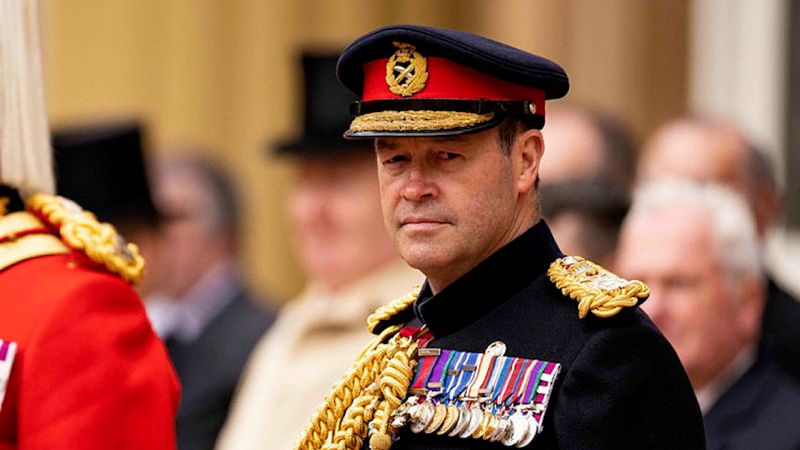General Sir Patrick Sanders: A Distinguished Military Leader
General Sir Patrick Sanders is a highly esteemed British Army officer who has played a pivotal role in shaping modern military strategy and operations. With a career spanning several decades, he has served in numerous high-profile roles, demonstrating exceptional leadership, strategic foresight, and operational expertise. His contributions to the British Armed Forces, particularly in adapting to the evolving landscape of warfare, have cemented his reputation as one of the most capable military leaders of his generation.
Early Life and Education
Patrick Sanders was born into a military family, which deeply influenced his career trajectory. He attended Worth School, an independent Catholic boarding school in West Sussex, before pursuing higher education at the University of Exeter, where he earned a degree in history. His academic background provided him with a strong foundation in strategic thinking, critical analysis, and a deep understanding of historical conflicts, all of which would prove invaluable in his military career.
Following university, Sanders attended the Royal Military Academy Sandhurst, the prestigious institution responsible for training British Army officers. Graduating with distinction, he was commissioned into the Royal Green Jackets (now part of The Rifles), marking the beginning of a distinguished military career.
Early Military Career and Deployments
Throughout his early career, Patrick Sanders gained extensive operational experience through deployments to some of the most volatile regions in the world. His leadership and tactical acumen were evident from the outset, earning him rapid promotions and increasing responsibilities.
Northern Ireland
Like many British officers of his generation, Sanders served in Northern Ireland during The Troubles, where he was involved in counterinsurgency operations. These experiences helped him develop a deep understanding of asymmetric warfare, counterterrorism, and the complexities of urban combat.
Balkans and Iraq
In the late 1990s and early 2000s, Sanders was deployed to the Balkans, where he contributed to NATO-led peacekeeping efforts in Bosnia and Kosovo. These operations reinforced his expertise in multinational military cooperation and conflict resolution.
During the Iraq War, Sanders played a key role in directing British forces, particularly in counterinsurgency operations. His leadership in Basra was crucial in managing security challenges, engaging with local populations, and coordinating with coalition partners.
Senior Command Roles and Leadership
Sanders’ ability to lead under pressure and adapt to rapidly changing battlefield conditions led to his appointment to a series of high-profile command positions. These roles allowed him to influence British military doctrine and strategy significantly.
Afghanistan Deployment
As a senior officer, Sanders was deployed to Afghanistan, where he commanded British forces during some of the most intense phases of the conflict. He worked closely with NATO allies and Afghan security forces to combat the Taliban insurgency. His experience in Helmand Province further solidified his reputation as a battle-hardened commander with a keen understanding of modern warfare’s operational and strategic dimensions.
Commander of the Field Army
As Commander Field Army, Sanders oversaw the training, preparedness, and operational effectiveness of the British Army’s land forces. His tenure in this role was marked by a strong emphasis on modernizing the force, improving readiness, and integrating advanced technology into military operations.
Chief of the General Staff
In 2022, Sanders was appointed Chief of the General Staff (CGS), the highest-ranking officer in the British Army. As CGS, he became responsible for setting strategic direction, ensuring operational readiness, and advising the UK government on military matters. His leadership during this period has been characterized by efforts to adapt the British Army to emerging threats, including cyber warfare, artificial intelligence, and hybrid warfare tactics employed by adversaries.
Military Philosophy and Strategic Vision
General Sir Patrick Sanders has consistently emphasized the need for the British Army to evolve to meet modern security challenges. He has been a vocal advocate for:
- Digitization and Technological Advancements: Recognizing the increasing role of technology in warfare, he has pushed for greater investment in cyber capabilities, AI, and autonomous systems.
- Adaptability in Warfare: He has stressed the importance of flexibility in military strategy, advocating for an army that can rapidly respond to emerging threats.
- Strengthening NATO Alliances: Understanding the importance of collective defense, he has worked to deepen cooperation with NATO allies and international partners.
- Enhancing Resilience: Sanders has championed measures to improve the resilience of the British Army in the face of potential future conflicts, including deterrence strategies against adversaries such as Russia and China.
Challenges and Future Prospects
As Chief of the General Staff, Sanders faces numerous challenges, including:
- Budget Constraints: Ensuring that the British Army remains well-equipped and prepared despite financial limitations.
- Recruitment and Retention: Addressing personnel shortages and attracting new talent to the armed forces.
- Evolving Threats: Responding to global security challenges, including cyber threats, hybrid warfare, and geopolitical tensions.
Despite these challenges, General Sir Patrick Sanders remains steadfast in his mission to maintain the British Army’s operational effectiveness and strategic relevance in an increasingly complex world.
Personal Life and Legacy
Outside of his military duties, Sanders is known for his intellect, strategic thinking, and commitment to service. He has been recognized with numerous military honors and awards, reflecting his outstanding contributions to the British Armed Forces. His leadership style is often described as pragmatic, forward-thinking, and deeply committed to the welfare of his troops.
As one of Britain’s most influential military figures, General Sir Patrick Sanders’ legacy will likely be defined by his efforts to modernize the British Army and prepare it for the challenges of the 21st century. His career serves as an inspiration to future generations of military leaders, demonstrating the importance of adaptability, strategic vision, and unwavering dedication to national security.

